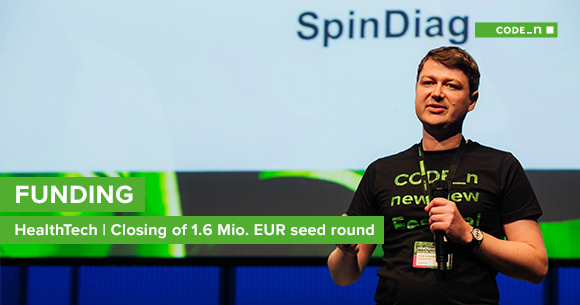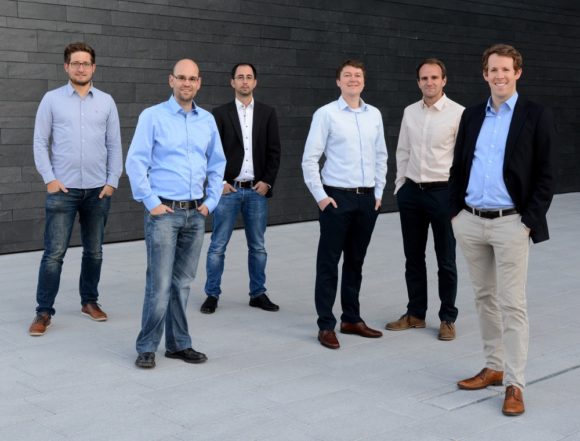"Bring lots of enthusiasm and perseverance": Alumnus SpinDiag shares lessons learned in finding investors
Some exciting news from the CODE_n Community! When we read the story at the end of last month it was nothing short of phenomenal. One of our alumni, the HealthTech startup SpinDiag, has just drummed up €1.6 million in seed capital. The team plans to use the funding to roll out its revolutionary point-of-care screening system for antibiotic resistance and conduct initial trials in hospitals. The HealthTech startup has been working on its novel solution since 2016, following a spinoff from the Hahn-Schickard R&D institute. The system could potentially save hundreds of thousands of lives, thanks to a simple screening test that can ascertain in as little as 30 minutes if a patient is carrying drug-resistant bacteria and thus requires treatment in isolation from other patients. Introducing the screening systems to hospital wards could drastically reduce mortalities resulting from germs: Colonization and infections can be detected immediately and positive patients treated in isolation, thus preventing the transmission of drug-resistant bacteria in the long term. We spoke to the team about the seed funding initiative and asked them what tips they would give to startups. Of course, we were also dying to hear about their plans!

Quarantine or not, what keeps all patients safe in hospitals? At the end of July, the experts at SpinDiag took a huge step forward in fulfilling their dream of preventing the hazardous infection of patients through drug-resistant germs in hospitals. Three private investors have put up €1.6 million for the startup’s screening system to undergo initial trials in hospitals. The system will provide doctors with an important weapon to prevent spreading of hard-to-treat infections in their hospitals. To see how this groundbreaking process works, watch the video:
Previously, testing for drug-resistances was an expensive and long-winded process. This was the motivation for SpinDiag to take laboratory testing to the patient. The team’s idea is a medical revolution and we can only congratulate the entrepreneurs for their success to date. We thoroughly enjoyed talking to the experts about the latest news and hope you enjoy the tips they provide for startups looking for an investor. Enjoy the read!
Lisa: Hello everyone, hi SpinDiag! First of all, congratulations all round on the success of your recent seed funding – €1.6 million! That’s amazing news! Could you take us through what happened?
SpinDiag: Thanks! Of course, we’re delighted and now we can really focus properly on working up our product. Looking back, it feels like our startup just shot up an exponential curve. Right at the beginning, around two and a half years ago, we started working on our first business in our spare time. We then checked the idea with potential customers and had to start some bits all over again. Then we got a first small injection of funding from the Federal Ministry of Education and Research (the BMBF) so we could analyze the market, and then things started to accelerate from there: we finally got to work on the topic full time. This was followed by several rounds of discussion with potential clients and before we knew it, we had a business model. The tool meets a huge medical need – how to provide evidence of drug-resistant germs quickly, across the board, and at an affordable price. Then one thing followed another. We successfully attracted further public funding and our product won over a variety of startup juries, including that of CODE_n. This momentum helped us show investors the results of our first round of laboratory testing and was vital for our seed initiative.
Lisa: How did you get in touch with the investors?
SpinDiag: Mainly by using our networks, but we also went to pitch days. Essentially it was a lot of spade work until we finally found the right one.
Lisa: What tips would you give to an ambitious startup looking for an investor? What was your experience with the process of finding funding?
SpinDiag: Bring lots of enthusiasm and perseverance. But don’t forget to do the painstaking preparation work on your target group. There’ll be setbacks and dry spells. One thing that can really help when these come is to take part in a lot of business plan competitions. They can provide you with valuable feedback and positive experiences to take with you when you talk to investors. And last but not least: use your networks and seek contact with possible multipliers.

The founder team (from left to right): Dominique Kosse, Dr. Daniel Mark, Dr. Oliver Strohmeier, Dr. Gregor Czilwik, Dr. Frank Schwemmer, and Dr. Mark Keller (Source: SpinDiag)
Lisa: According to things we heard from two other HealthTech startups, monikit and BABYBE medical, launching a product in the medical market takes plenty of staying power. What have your experiences been as a startup in the healthcare industry?
SpinDiag: We can only agree with them. But fortunately, we managed to get a lot of the preparation work done in advance through the “mother ship,” the Hahn-Schickard Institute.
Lisa: Where did the idea behind SpinDiag come from? How have you funded things until now?
SpinDiag: We’ve always spent a lot of time thinking about the needs of doctors and patients as part of our R&D work at Hahn-Schickard. We worked with them on point-of-care solutions. Based on this knowledge, we were convinced our diagnostic system would add genuine value when it comes to patient care. As far as we were concerned, the best way to launch the product on the market quickly was to use a startup, so we just got on with agreeing the business model. At the beginning, it was just in our free time and later we had public backing. Now of course it’s being funded by investors.
Lisa: What have been the biggest challenges for you setting up your own company? How did you overcome these challenges and what did you learn from them?
SpinDiag: The biggest challenge was definitely looking for investors. The thing I learned personally was to embark on the search with lots of stamina and the will to keep improving the business model. Use the feedback from investors to make the company more and more appealing.
Lisa: What are your three most important tips for young startups or people aspiring to found a company?
SpinDiag:
- If you’re enthusiastic about your business model, ask potential clients what they think about it and use the feedback to make improvements.
- Bring in consultants or partners to help you in the areas where you lack expertise.
- Have lots of stamina and enthusiasm – it’s great fun promoting your own vision.
Lisa: You took part in the CODE_n CONTEST at the new.New Festival in 2016 and won the prize for the HealthTech cluster. What was your experience at the competition and what memories did you take with you?
SpinDiag: The most important thing for us was the number of new contacts we made at the event. They’re still in touch with us today and have done lots of things to help us move forward. We also found the whole atmosphere at the event so special; it was unique. You had this sense that the startups at the event had this real vision, with every potential to change the world. This spirit, the cluster prize and a sign with our company logo on it went home with us in a suitcase and we’re still feeding off it today. And I don’t just mean the company logo on the sign that welcomes visitors to our office …
Lisa: What do you have planned next? When will the first trials get underway in the hospitals, and when is the SpinDiag One System likely to hit the market?
SpinDiag: We’re currently transferring our prototype to the injection mold and developing an improved prototype of the equipment together with our partners. We’d like to carry out the first testing in hospitals at the beginning of 2018. Product development, clinical performance assessment, and market launch will probably be completed by the end of 2019.
Lisa: Thank you for your insightful thoughts and for telling us about your experiences. We look forward to hearing how the hospital trials go and until then we hope it goes well with your project, which is worth every cent of support. Let’s stay in touch and we’ll keep everyone posted.






Write a comment